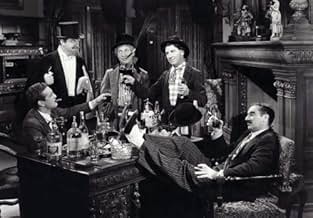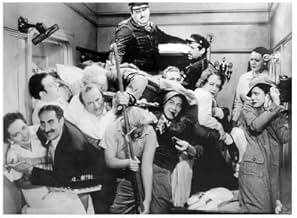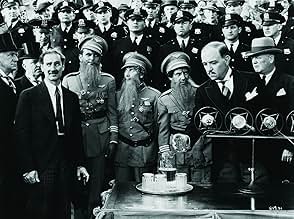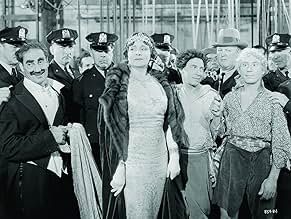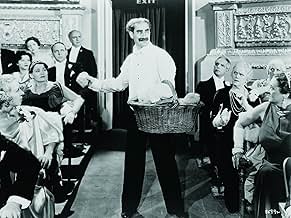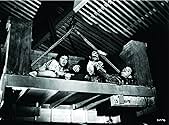NOTE IMDb
7,8/10
36 k
MA NOTE
Un directeur sournois et les deux amis loufoques de deux chanteurs d'opéra aident ceux-ci à obtenir la gloire tout en humiliant leurs ennemis guindés et snobs.Un directeur sournois et les deux amis loufoques de deux chanteurs d'opéra aident ceux-ci à obtenir la gloire tout en humiliant leurs ennemis guindés et snobs.Un directeur sournois et les deux amis loufoques de deux chanteurs d'opéra aident ceux-ci à obtenir la gloire tout en humiliant leurs ennemis guindés et snobs.
- Réalisation
- Scénario
- Casting principal
- Récompenses
- 3 victoires au total
Walter Woolf King
- Rudolfo Lassparri
- (as Walter King)
Sig Ruman
- Herman Gottlieb
- (as Siegfried Rumann)
Robert Emmett O'Connor
- Police Sergeant Henderson
- (as Robert Emmet O'Connor)
Enrique Acosta
- Nightclub Guest
- (non crédité)
Harry Adams
- Opera Spectator
- (non crédité)
Harry Allen
- Doorman
- (non crédité)
Sam Appel
- Dungeon Guard
- (non crédité)
King Baggot
- Dignitary
- (non crédité)
Marion Bell
- Lady looking for 'Aunt Minnie'
- (non crédité)
Edna Bennett
- Maid
- (non crédité)
Dolly Blackburn
- Little Girl watching Harpo playing
- (non crédité)
Résumé
Reviewers say 'A Night at the Opera' is celebrated for its iconic comedic routines and the Marx Brothers' unique blend of verbal and physical comedy. Groucho's wit, Chico's musical talents, and Harpo's slapstick humor are highlighted. Margaret Dumont's role and musical numbers add entertainment value, though some criticize their integration. The film is praised for its production quality and subversion of high society norms. However, a perceived shift towards more structured comedy marks the beginning of a decline in their later works.
Avis à la une
No doubt that "A Night at the Opera" is right up there with "Duck Soup" as the best Marx Brothers movie. Some Marx-purists complain "ANatO" is when the brothers started to grow soft and their quality started to decline. For one thing, instead of ridiculing romantic couples (the love story subplot plays a big part), they support them. Also, it's not as surreal or satirical as their past films. To those purists, I say: Lighten up! "ANatO" is just as funny as anything the Marx Bros did in the past (heck, I think it's funnier than "Monkey Business"), and it's withstood the test of time perfectly. In fact, "ANatO" is said to be Groucho's favorite; he even called his previous films "duds"! The film is filled with jabs at the upper class and double entendres courtesy of Groucho. Sample:
Mrs. Claypool: Do you have everything, Otis?
Otis: I haven't had any complaints yet!
The love story subplot isn't as nauseating as 1937's "A Day at the Races". Allan Jones may be a bit too mushy, but Kitty Carlisle, the love interest, is cool and calm enough to help it go down easily (that's really her singing, by the way). Chico and Harpo have some inspired moments, such as their gleeful butchering of "Il Travotore" (sp?). The hapless villains are the funniest Marx foils ever, and the finale is just uproarious. "ANatO" is a wonderfully silly romp, and it's rather harmless, so kids can probably watch and enjoy it. The famous stateroom scene is nothing short of brilliant, and you'll find yourself humming along to "Cosi Cosa" (I just wish the ballad "Alone" had been left, well, alone). Don't miss this hilarious masterpiece. And now, on with the opera!!
Mrs. Claypool: Do you have everything, Otis?
Otis: I haven't had any complaints yet!
The love story subplot isn't as nauseating as 1937's "A Day at the Races". Allan Jones may be a bit too mushy, but Kitty Carlisle, the love interest, is cool and calm enough to help it go down easily (that's really her singing, by the way). Chico and Harpo have some inspired moments, such as their gleeful butchering of "Il Travotore" (sp?). The hapless villains are the funniest Marx foils ever, and the finale is just uproarious. "ANatO" is a wonderfully silly romp, and it's rather harmless, so kids can probably watch and enjoy it. The famous stateroom scene is nothing short of brilliant, and you'll find yourself humming along to "Cosi Cosa" (I just wish the ballad "Alone" had been left, well, alone). Don't miss this hilarious masterpiece. And now, on with the opera!!
"A Night at the Opera" is great Marx Brothers entertainment. It has comedy, music, and a good cast - everything except Zeppo, who by this time had left the act. It fully deserves its reputation as one of the two best Marx Brothers films, along with "Duck Soup".
"A Night at the Opera" is probably slightly less funny than "Duck Soup" (it is no criticism to say that of any film), but it has more of a story to connect the great comic bits. There is a good supporting cast in both films - here Sig Ruman is especially funny, in addition to the perennial Margaret Dumont. It also has several fairly long musical interludes - some are operatic, but the most entertaining is Chico and Harpo's impromptu shipboard entertainment.
Of course, the real attraction in any of these films is the comedy, and there are some memorable bits in this one. The contract negotiations between Chico and Groucho, and the scene in Groucho's stateroom, are especially hilarious, and you have to see the stateroom scene more than once to catch everything. And for sustained zany humor, the climactic sequence at the opera might be the funniest part of all.
This is certainly a must for Marx Brothers fans.
"A Night at the Opera" is probably slightly less funny than "Duck Soup" (it is no criticism to say that of any film), but it has more of a story to connect the great comic bits. There is a good supporting cast in both films - here Sig Ruman is especially funny, in addition to the perennial Margaret Dumont. It also has several fairly long musical interludes - some are operatic, but the most entertaining is Chico and Harpo's impromptu shipboard entertainment.
Of course, the real attraction in any of these films is the comedy, and there are some memorable bits in this one. The contract negotiations between Chico and Groucho, and the scene in Groucho's stateroom, are especially hilarious, and you have to see the stateroom scene more than once to catch everything. And for sustained zany humor, the climactic sequence at the opera might be the funniest part of all.
This is certainly a must for Marx Brothers fans.
This is probably the best Marx Brothers film. It is certainly my favorite. The brothers destroy pomposity and pretension by the ton. The pieces of comic business were worked out through many live theater performances before the scenes were finally filmed. This craftsmanship never shows, but it pays off completely. The stateroom scene is a classic, and the total devastation of the opera is a delicious piece of craziness.
Groucho Marx is in his element as slick, fast talking business manager Otis B. Driftwood, who spends his time playing up to arts patron Mrs. Claypool (classic Marx Bros. foil Margaret Dumont). When he sees that she's willing to pony up $1,000 a night to have pompous Lassparri (Walter Woolf King) sing, he wants a piece of the action. Circumstance soon throws him together with equally sly Fiorello (Chico) and goofy Tomasso (Harpo), as they become determined to help out young lovers & aspiring opera stars Rosa (Kitty Carlisle) and Ricardo (Allan Jones).
Even if one is not a fan of the opera, they shouldn't let that dissuade them from checking out the Marx Bros. in their glory. Some buffs consider this their best film, and it certainly shows off their talents to memorable effect. Musical interludes do go on a bit long, but the quality of the comedy when it occurs is top notch. There are some truly great bits in here, like the "party of the first part" contract, the overcrowded (to say the least) stateroom sequence, and the frantic, farcical efforts of Otis, Fiorello, Tomasso, and Ricardo to pull the wool over the eyes of a suspicious inspector (Robert Emmett O'Connor) by moving beds from one room to another.
Groucho is hilarious, as always. Very few entertainers in film history can fire off a one-liner as snappily as he does. Chico and Harpo have their wonderful moments, as well. (It's such a hoot when Harpo does a Spider-Man routine near the end.) Carlisle and Jones are extremely appealing, Dumont is once again a fine "straight woman", King is an appropriately snooty villain, Sig Ruman is superb as eternally frustrated Gottlieb, and O'Connor is likewise good as the antics of Otis and company take a toll on him.
The pace isn't always consistent, but there is some enjoyable action and first rate stunt work. Overall, this is a solid comedy / musical that will appeal to any lover of this era in cinema.
Eight out of 10.
Even if one is not a fan of the opera, they shouldn't let that dissuade them from checking out the Marx Bros. in their glory. Some buffs consider this their best film, and it certainly shows off their talents to memorable effect. Musical interludes do go on a bit long, but the quality of the comedy when it occurs is top notch. There are some truly great bits in here, like the "party of the first part" contract, the overcrowded (to say the least) stateroom sequence, and the frantic, farcical efforts of Otis, Fiorello, Tomasso, and Ricardo to pull the wool over the eyes of a suspicious inspector (Robert Emmett O'Connor) by moving beds from one room to another.
Groucho is hilarious, as always. Very few entertainers in film history can fire off a one-liner as snappily as he does. Chico and Harpo have their wonderful moments, as well. (It's such a hoot when Harpo does a Spider-Man routine near the end.) Carlisle and Jones are extremely appealing, Dumont is once again a fine "straight woman", King is an appropriately snooty villain, Sig Ruman is superb as eternally frustrated Gottlieb, and O'Connor is likewise good as the antics of Otis and company take a toll on him.
The pace isn't always consistent, but there is some enjoyable action and first rate stunt work. Overall, this is a solid comedy / musical that will appeal to any lover of this era in cinema.
Eight out of 10.
I didn't fully appreciate this film until my second viewing. Now I think it's one of the better Marx Brothers film. The film - filled with funny lines - has all the familiar MB trappings: good slapstick, good and bad jokes and routines, wild scenes, several musical numbers and general overall chaos.
The only thing not appealing to me in the film were some of the songs - not all, just some. Otherwise, it was all fun as Groucho, Chico and Harpo all share humorous lines and/or sight gags. Kitty Carlisle doesn't offer much in the way of a young beauty but it was still interesting to see her at this age as I had only known her through her "To Tell The Truth" television days. Alan Jones, meanwhile, is a pleasing singer and a nice guy, as always.
This is the film with the famous scene involving a ton of people being stuffed into Groucho's small cabin room. It's more amazing than funny. My favorite scenes were when Groucho and Chico got into discussions and trade lines back-and- forth. I also laughed heartily at the finale with Harpo swinging like Tarzan at the opera house.
In all, a funny MB film, one of the boys' better efforts. I play it with the English subtitles so as not to miss any of the great lines of dialog in here.
The only thing not appealing to me in the film were some of the songs - not all, just some. Otherwise, it was all fun as Groucho, Chico and Harpo all share humorous lines and/or sight gags. Kitty Carlisle doesn't offer much in the way of a young beauty but it was still interesting to see her at this age as I had only known her through her "To Tell The Truth" television days. Alan Jones, meanwhile, is a pleasing singer and a nice guy, as always.
This is the film with the famous scene involving a ton of people being stuffed into Groucho's small cabin room. It's more amazing than funny. My favorite scenes were when Groucho and Chico got into discussions and trade lines back-and- forth. I also laughed heartily at the finale with Harpo swinging like Tarzan at the opera house.
In all, a funny MB film, one of the boys' better efforts. I play it with the English subtitles so as not to miss any of the great lines of dialog in here.
Le saviez-vous
- AnecdotesIn exasperation after several attempts to have Groucho Marx read one of his lines in the manner director Sam Wood had requested, Wood exclaimed, "I guess you just can't make an actor out of clay." Groucho Marx instantly responded, "Nor a director out of Wood."
- GaffesRicardo is clearly standing on the dock as the ship pulls away, yet he turns up on board later as a stowaway.
- Citations
Otis B. Driftwood: It's all right, that's in every contract. That's what they call a sanity clause.
[Fiorello laughs loudly]
Fiorello: You can't fool me! There ain't no Sanity Claus!
- Versions alternativesAll references to the first portion of the film taking place in Italy were edited from the original negative sometime after the original release. There is speculation that this was done during WWII when Italy was as Axis power, but it also may have been done in the late 1930's to appease Mussolini, who didn't like the way Italians were being portrayed. Either way, the film's first scene begins rather abruptly and is missing a musical number and references to Milan, Italy.
- ConnexionsEdited into Apaga y vámonos: Épisode #1.5 (2013)
- Bandes originalesIl Trovatore: Di quella pira
(1853) (uncredited)
Music by Giuseppe Verdi
Libretto by Leone Emanuele Bardare and Salvatore Cammarano
Sung by Walter Woolf King
with The MGM Symphony Orchestra
Meilleurs choix
Connectez-vous pour évaluer et suivre la liste de favoris afin de recevoir des recommandations personnalisées
- How long is A Night at the Opera?Alimenté par Alexa
- How much was $9.40 worth when this film was made?
Détails
Box-office
- Montant brut mondial
- 8 200 $US
- Durée1 heure 36 minutes
- Couleur
- Rapport de forme
- 1.37 : 1
Contribuer à cette page
Suggérer une modification ou ajouter du contenu manquant

Lacune principale
By what name was Une nuit à l'opéra (1935) officially released in India in English?
Répondre


